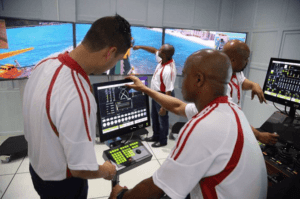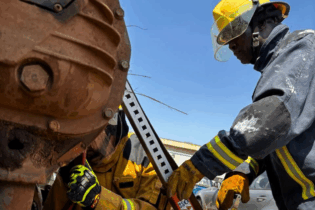Africa’s first ever dredging simulator has been launched in the port city of Durban.
It is the result of collaboration between Transnet National Ports Authority (TNPA), the Transnet Maritime School of Excellence (MSoE), Netherlands-based Royal IHC and its Training Institute. The high-tech simulator – based at the MSoE’s Langeberg Road premises – will aid in building dredging capability in South Africa. Dredging is specialised underwater excavation that helps to keep ports and harbours safe and navigable and is a critical aspect of port development. Transnet anticipates that over the first three-year period 50 students will complete training on the simulator as part of a holistic dredging training programme and could find work in Southern Africa or with international dredging contractors. TNPA Chief Executive, Richard Vallihu, said the simulator would enable TNPA to support ports in Southern Africa to develop marine skills and grow their economies. “Through this acquisition, we can create jobs in line with the Government’s Nine-Point Growth Plan. Among the key focus areas of TNPA’s R56 billion-plus investments under the Transnet Market Demand Strategy (MDS) are creating capacity ahead of demand, maintenance upgrades, skills development and job creation.“We are therefore striving to build our own capabilities by developing mission-critical skills that will help us to cater to the needs of the Southern African port system. Instead of sending staff overseas for dredging training we can now do this locally through the dredging school to be fully operational by 2017.
“A number of regional ports are also ramping up plans to expand port capacity including major dredging projects, so we would like to be in a position to provide human capacity for that as well in the near future,” he said. The multi-million Rand simulator mimics the control panel of an actual dredging vessel, complete with an environmental simulation of weather conditions, sea states, and soil types. This provides realistic training situations while eliminating the risk of accidents, production losses, damage and injuries that could occur while training in real life. TNPA, the MSoE, and Royal IHC have packaged a special dredging training programme that incorporates 12 weeks of classroom theory, eight weeks of simulation training and six months of practical training onboard a real dredging vessel. The simulator will help to hone critical technical skills required for professions such as pipe operators, Dredge Masters and Dredging Managers. The first intake of trainees – six pipe operators – will commence training in January 2017.






